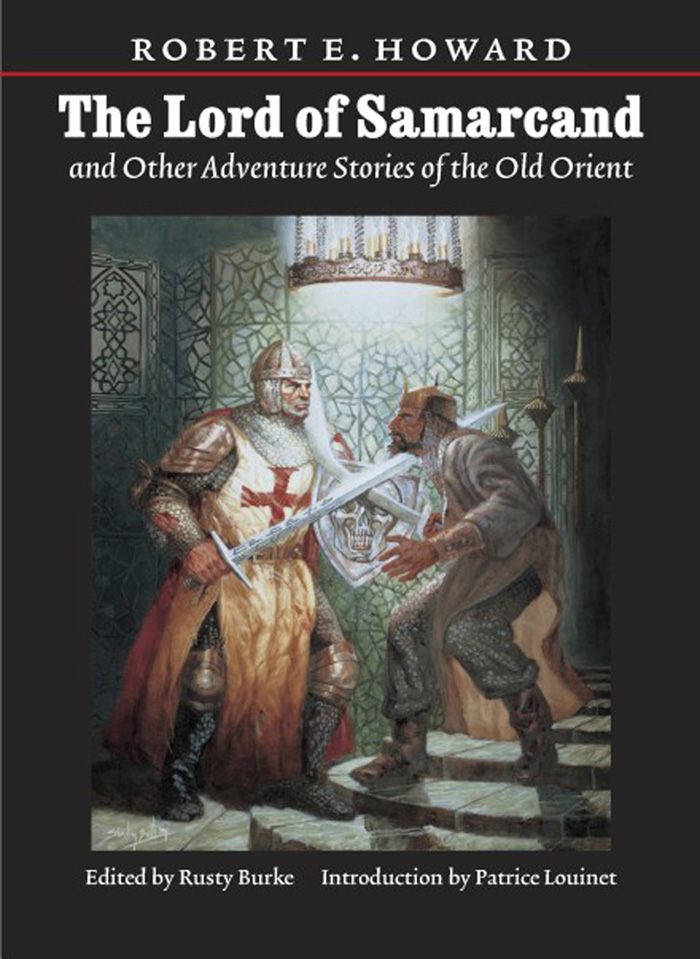
Background Colour: -White- -NavajoWhite- -Wheat- -Beige- -AntiqueWhite- -LightGray- -Silver- -BurlyWood- -Tan- -Black- -Blue-
Text Colour: -Black- -Brown- -Blue- -Green- -Red- -Yellow- -White- -Orange- -Silver-
Published in Lord of Samarcand and Other Adventure Tales of the Old Orient, 2005.
(The cover says “Stories” while inside it has “Tales.”)
The Persians had all fled and the Kalmuks were all dead but the remnants of the Torguts and the Mongols rallied around their khan in a solid ring of steel against which the wild charges of the Turks crashed and shattered like sea spray against a great rock. The turbaned forms ringed the circle of the defenders in waist-high piles. But not all the still forms were Turks. The Tatars were falling fast. Great gaps appeared in the circle and seeing this, Galdan Khan drew off the light-armed troops and while the light Kirghiz horsemen harried the Tatars, the Great Khan formed his heavily armed squadrons, the Janizzaries, and hurled them against his dauntless foes. Like a mighty tidal wave of steel the savage warriors swept across the gory field upon the Unbelievers. The shout of, “Allah il Allah—rassoul-il-allaho!” rose to the skies and drowned the yells of the Kirghiz and the battle-cry of the Tatars. The Tatar formation was shattered and the warriors of the North were scattered like chaff before a whirlwind. But the battle was not over. Borak still lived and Alashan and Cheke Noyon and Ukaba Khan and some nine hundred Tatar warriors. Until a Tatar’s head is off never say that his fighting is over.
All over the field handfuls of Tatars stood back to back and plied their deadly blades. Some strove to keep with their king but that was impossible. Not for Borak Khan a back-to-back defense. He ranged that sea of whirling swords like a wolf in a sheepfold. Since noon when he had seen the Crescent banner come over the mountain pass he had known his great army was doomed and he had planned like a devil and fought like a wild beast to snatch victory from ruin. In vain. In scores, in hundreds and in squadrons his men had fallen and he had seen his khans, his chiefs and his councillors go down one by one. Now his spirit was not that of a king striving to save a great people but the spirit of a man gone mad with hate and the lust of slaughter. He fought like a barbarian king, like a man whose standards are down and who has lost a kingdom. He had emptied his quiver, thrown his javelin, broken his spear, shattered his battle axe and now he gripped a long sword that was bathed in blood from point to hilt. That sword was like a hammer of Thor. In the hand of the devil incarnate that wielded it, it was a living flame. It cleft skulls, severed breasts, shore off heads and ripped up bellies. Borak had become in truth, the Wolf. Only four of his warriors could keep within calling distance of him as he hacked his way from one side to the other, seeking Galdan Khan. These four were Cheke Noyon, Alashan, Ukaba Khan and Atai, chief of the Mongols.
In a space where the dead men were piled high and where no living man remained, the four paused for breath.
“Ai,” gasped Alashan, “the khan is as one possessed. Erlik, what a warrior! A falcon!”
Ukaba Khan smiled. “He is selling his life dearly for he is mad with defeat. That is all that is left to us. The Northern kingdom is no more. Hark, the Janizzaries raise already the cry of triumph. But let them not rejoice until they have the head of Borak Khan. For myself I wish only to die by my chief with my saber red with Turkish blood.”
Alashan sighed. “I should like to see Aina before I die.”
“If I can but face Zemal Noyan for a moment,” said Adai grimly, “I will be content to pass through the Gate In The Skies.”
Cheke Noyon said nothing. He flung his great, curved sword high in the air and caught it. His grizzled, lionlike head went back and from his lips came the terrible quavering yell—the battle-cry of the Grey Wolf Tatars. Swinging his heavy blade he hurled himself into the midst of the battle. The others followed.
The old chroniclers tell of that battle better than my feeble pen can narrate. They tell how the surviving Tatars ranged the field like hungry wolves. Of how Galdan Kahn’s three sons and ten of his khans died by the hands of the Tatar chief and his four followers. And of how the four fell one by one. Alashan fell first, guarding his chiefs back. Then Atai, bleeding from a hundred wounds, came face to face with Zemal Noyan and the traitor died beneath a Mongol sword and Atai died above him.
(I have changed nothing, so don’t blame me for spelling errors—“chiefs,“ etc.)